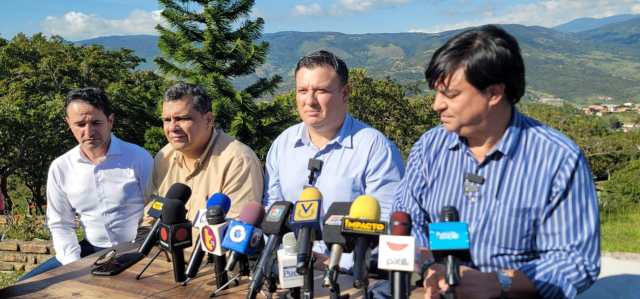
As part of an industrial visit carried out last weekend by Colombian businessmen together with trade union authorities from Táchira State to four industries in the entity, the businessmen asked Nicolás Maduro’s regime to make the passage of import and export goods more flexible, as well as such as lifting off the restrictive measure of the Autonomous Service of Registries and Notaries (Saren) that prohibits foreigners from investing in Venezuela.
By Luz Dary Depablos / Correspondent lapatilla.1eye.us
Juan Gabriel Pérez, Executive President of the Colombian-Venezuelan Chamber, said that: “two or three years ago, binational trade between Colombia and Venezuela was two million dollars. In 2022 we traded more or less 722 million dollars. and this year we are going to be close to between 800 and 900 million dollars.”
Although he pointed out that between January and August of this year, Venezuela’s exports to Colombia have increased, the brother country continues to be the major beneficiary of this exchange, since its exports to Venezuela are more than 80% of all trade.
For his part, Yionel Contreras, President of the Chamber of Commerce and Industries in Táchira (CCIT), stated that the reopening of the border has left positive and negative aspects in the state’s economy, since the balance continues to tilt heavily in favor of Colombia. “In some cases, the commercial exchange from Colombia to Venezuela is 90% to 10% from Venezuela to Colombia.”
“We are coming from a very strong economic contraction, from a quite complex process and our companies are not at the top of their installed capacity,” he said.
Operation Iron Hands affects formal businessmen
Contreras also reported that last week representatives of the CCIT met with officers from the military high command and Maduro’s economic vice presidency, where they expressed their concern about the scope of Operation Iron Hands.
He explained that the businessmen initially respected and applauded this action, but: “downstream it is distorted by lower-ranking officials, because smugglers continue to pass merchandise, because they extort ‘fees’ at checkpoints, and they require documents from the formal importers ‘that do not exist’.”
He assured that these obstacles are affecting the circulation of products and legal merchandise, mainly throughout the border states. “It seems that the military forces, mainly those who make up the Iron Hands Commission, believe that in Táchira there are no industries or there are no people who work, and they believe that everything comes from Colombia along the illegal trails.”
“All of us who are formal businesses are in a state of defenselessness, because they stop us at each and every checkpoint, and those who do not comply with the ‘formality’ (extortion fee) are subject to them doing their thing.” Therefore, he demands an approval of permits, in order to avoid these irregularities.
He noted that blackouts and lack of fuel continue to affect productivity. However, businessmen are adapting to the circumstances, “this has not been the only adversity they have had,” he said.
They are also waiting for a response from the Ministry of Justice so that the prohibition on Colombians being able to register companies in Venezuela is repealed and thus boost the economy between both nations.

